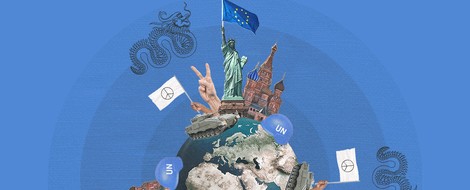Your podcast discovery platform
Curious minds select the most fascinating podcasts from around the world. Discover hand-piqd audio recommendations on your favorite topics.

piqer for: Climate and Environment Globalization and politics
Raksha Kumar is a multimedia journalist focusing on human rights, politics and social injustices. Since 2011, she has reported for The New York Times, BBC, Guardian, TIME, South China Morning Post, Foreign Policy, Scroll.in and The Hindu.
In March 2018, she was awarded the National Foundation for India Media Award for her reportage on land rights in India. In 2017, she was shortlisted for Kurt Schork Memorial Awards in International Journalism. For her work on land conflicts in India, she was awarded the Chameli Devi Award for Outstanding Media Personality in 2016.
As a reporter, her focus areas are land and forest rights of the most vulnerable communities. However, since these issues cannot be looked at in isolation, Raksha found herself increasingly reporting on armed conflict around resource extraction in places like Chhattisgarh and Kashmir.
In 2015, she wrote, shot and directed a documentary film on Rationalists in Contemporary India. It was aired by India's public broadcaster, Doordarshan. The film has been screened in 29 locations across the country until now.
The same year, Raksha was selected as a Chevening Fellow by the University of Westminster to research on Hindu Right in the UK. This helped Raksha build on her post graduate dissertation which was on Hindu Fundamentalists in India.
With a Fulbright Scholarship for Leadership Development, she went to the Columbia University in New York City to pursue a Masters in Science. As a student, she was offered the Scripps Howard Fellowship to report from Israel and the West Bank. Since 2011, Raksha has reported from 11 countries across the world.
Raksha worked as an editor at NDTV, leading English news channel in India. She was the editorial head of a two-hour prime time news show, where she lead a team of about 20 junior journalists.
A graduate of Lady Shri Ram College in New Delhi, Raksha was a dedicated student and a passionate public speaker.
India’s New Billionaires Have Accumulated More Money, More Quickly, Than Plutocrats In Any Country
In 2014, when the current Prime Minister of India was elected to office, one of the promises made was to curb corruption. The ruling party, the Bharatiya Janata Party, has marketed itself as a corruption-free party since the 1980s.
It was meant to be a 'party with a difference' in comparison to the corrupt Congress Party.
The previous Congress-led government was accused of siphoning off billions of dollars in corrupt coal and telecom deals, and the Modi government was elected to put an end to it.
Narendra Modi pledged to end a situation in which the country’s ultra-wealthy — sometimes called 'Bollygarchs' — appeared to live by one set of rules, while India’s 1.3 billion people operated by another. Yet as they continue to hide out in cities like London, men like Mallya and Nirav Modi have come to be seen as representing the failure of that pledge.
According to official figures, the last three decades have seen an extraordinary explosion of wealth at the top of Indian society.
In the mid-1990s, just two Indians featured in the annual Forbes billionaire list, racking up around $3bn between them. But against a backdrop of the gradual economic re-opening that began in 1991, this has quickly changed. By 2016, India had 84 entries on the Forbes billionaire list. Its economy was then worth around $2.3tn, according to the World Bank. China reached that level of GDP in 2006, but with just 10 billionaires to show for it. At the same stage of development, India had created eight times as many.
The piece gives a good overview of why India is the fastest-growing economy and at the same time is counted among the poorest of nations.
